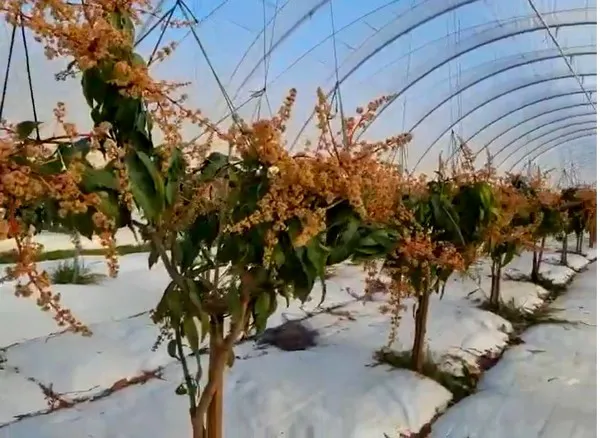Tropical fruit has become very important in global trade, especially in Europe, where the demand has been growing rapidly in recent years. Imports have grown hand in hand with the consumption (for which future prospects are looking good), so the fact that the continent's southernmost regions can have their own production with a minimal carbon footprint, not only of the most popular tropical crops, but of an interesting range of exotic fruits, is very attractive for local producers, for which it is essential to have the right technical assistance and commercial support.

Mari Luz Iglesias in an avocado plantation in Algarve, Portugal.
"At Iberian Exotics we offer agronomic and commercial advice to help growers choose varieties with added value in the market and allow them to achieve better results," says Mari Luz Iglesias, who, together with Hugo Leitao, has made her extensive experience in the tropical fruit sector available to growers through Iberian Exotics, based in Lisbon. "Our goal is to offer them an alternative that is economically profitable, so that they can assess it and choose the best option, and then help them in the marketing, which is equally important."
"What do we get with this? Customers who obtain the product they need and which their market demands, and growers with the guarantee and peace of mind of knowing that what they produce will be successful in the market. And always with the sanitary guarantees to be expected here in Europe," says Mari Luz in the following video:
"We are already carrying out several projects in Portugal, Spain and Italy with crops such as papayas, passion fruit, chayote or limes. As for mangoes, we always advise growers to plant the Irwin variety, as well as the Sensation or Kent, which offer greater value in the field compared to varieties such as the Osteen, of which large volumes are harvested in a very short period of time."

Irwin mangoes in bloom in a greenhouse in Algarve, Portugal.
"We also market prickly pears from Sicily, where up to 2 trucks per week are loaded during the season, grapes from Spain and Italy, and we have recently started producing red-fleshed pitahaya, a variety that customers are demanding from us."

Pitahaya plantation in Sicily, Italy.
"Another product that could be a good alternative in this area where tropical species can be grown is the Macadamia nut. We have carried out studies and have already made contacts, and we are waiting for a project to go ahead that would make us pioneers in Europe in the production and marketing of this nut, which until now has only been imported to the continent."

Hugo Leitao
Iberian Exotics is thus facilitating the production of local tropical and exotic fruits in Europe, helping establish the very important connection between the producer and the marketer, which is always necessary to ensure the success of any agricultural project.
"We have the support of the suppliers at all times. There is consensus on the sales conditions and, most importantly, we have their trust," says Mari Luz.
"Moreover, we are taking Iberian Exotics a step further. We have started with our own production and, in fact, we are currently interested in finding land to continue expanding in Portugal, specifically in the Algarve, in southern Spain and in the Italian region of Sicily," says Mariluz. "Also, we will soon be opening a new office in Spain; an addition to the one we already have in Portugal."
 For more information:
For more information:
Iberian Exotics
Lisboa (Portugal)
Mari Luz Iglesias (+34) 637 319 656
Hugo Leitao (+351) 961 301 952
[email protected]
https://iberianexotics.com
